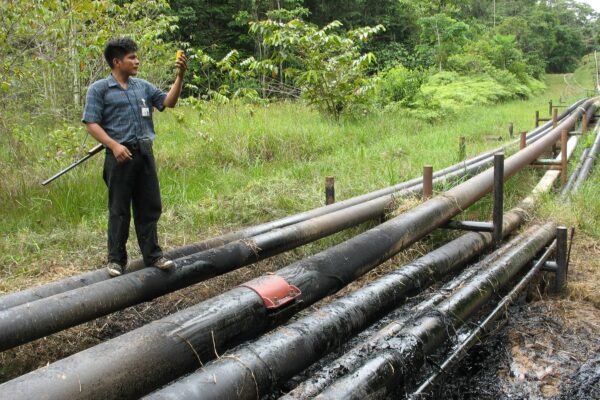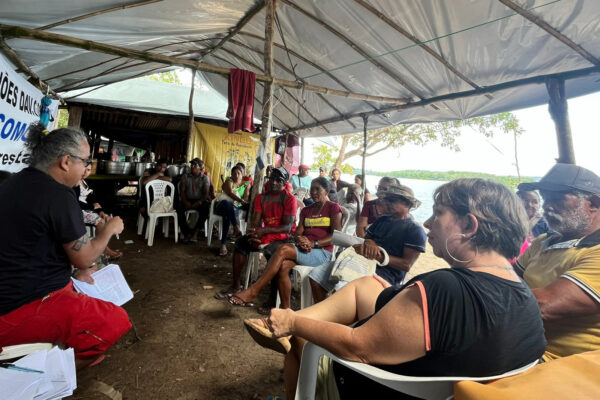November 11, 2009 – From the 23rd to the 25th of November, the Plataforma BNDES, a representative body of more than thirty organizations, social movements and networks from Brazilian civil society, will be hosting the first annual ‘Meeting of Populations Affected by BNDES Financed Projects’ at the Circo Voador in Rio de Janeiro. The meeting is intended to, among other objectives, expose the social, environmental, cultural, and economic impacts caused by undertakings financed by one of the world’s largest development banks – the Brazilian National Bank of Social and Economic Development (BNDES). BNDES loans more than the combined capital value of all loans from the World Bank, Inter-American Bank of Development (BID) and Eximbank.
The meeting, which should bring together at least 200 people from around the country, will finally give a voice to the populations directly affected by BNDES projects. The issues raised by meeting participants will include the loss of their lands and the destruction of their traditional way of life, the elimination and uncertainty of peoples’ employment, the disruption of food production, the continuation of slave labor practices, impacts related to the deforestation and degradation of the ecosystems upon which they rely, the privatization of rivers and other water sources, agrarian conflicts and the intensive exploitation of natural resources.
With a record budget of R$160 billion for the year of 2009, BNDES has assumed a central role in the definition of Brazil’s development model for some years. The bank widely prioritizes the financing of Brazilian and foreign multinationals within the ethanol, hydroelectric, paper and cellulose, mining, and agricultural sectors, all with elevated socio-environmental costs. Out of BNDES’s total budget distributed in 2008, barely 10% was directed to micro and smaller investments, while large and already well-established companies, even in the international market, received 76% of the Bank’s financial resources. The Plataforma BNDES demands that the bank promote a kind of development that does not concentrate income and lead to social exclusion, but rather one that contributes to overcoming inequality.
“It is time to expose and charge the bank with co-responsibility for these impacts. In fact, BNDES is responsible for a standard of development centered around productive specialization within intensive sectors which strictly benefits big multinational and national companies, allows for little employment opportunity and creates significant environmental and social impacts on the ground”, said Luiz Dalla Costa of the national cooperative, the Movement of Peoples Affected by Dams (MAB) and of Via Campesina.
Apart from the substantial funding conceded to a small and privileged group of companies, BNDES also holds stakes in several of these companies. In the mining sector, for example, it is a shareholder of Vale, making BNDES directly responsible for the unemployment of approximately two thousand workers who were recently laid off by the mining company. In the livestock sector, BNDES Participações (BNDESPar) holds a 26.9% stake in the company Bertin and 19.4% stake in JBS Friboi – and therefore is also partly responsible for the deforestation of the Amazon made by cattle ranchers. In the ethanol sector, BNDES is a major shareholder of Brenco (the Brazilian Company of Renewable Energy), who are being tried for the exploitation of their workers claiming to be working under slave labor conditions. BNDES has similarly financed a major hydroelectric dam project on the Madeira River with a loan of R$ 13 billion, where those responsible for the carrying out project were accused for engaging in slave labor practices this year. The bank is equally linked to the internationalization of companies in these sectors, particularly in South America and Africa.
We must clarify that BNDES prioritizes investments in private groups, while BNDES funds mostly come from the Workers Support Fund (FAT) and the National Treasury. “We want BNDES, a 100% government-owned bank, to fulfill the role of a bank that is 100% owned by the public. There is no justification to invest workers’ money in millionaire companies while Brazil remains one of the world’s champions of social inequality. The Plataforma BNDES demands that the bank finance a model of development that is just”, says Gabriel Strautman, executive secretary of the Brazilian Network on Multilateral Financial Institutions.
Other demands from within the organizational body of the Plataforma BNDES include the adoption of a clear and transparent policy of information sharing (concerning the banks entire portfolio of private projects, classification of the environmental risks of its projects, the criteria for project approval, company and project beneficiaries outside of the country) and the adoption of social and environmental criteria within the review and granting of the bank’s credit.
For more infomation about the Plataforma BNDES:
www.plataformabndes.org.br
Operating Commission:
The Indigenous Missionary Council (Cimi), The National Federation of Workers in Family Agriculture (Fetraf), Bolivian Forum for the Environment and Development (Fobomade), Brazilian Forum of a Solitary Economy (FBES), Brazilian Institute of Social and Economic Analysis (IBASE), Justiça Global, Movement of People Affected by Dams (MAB), Landless Workers Movement (MST), the Brazilian Network on Multilateral Financial Institutions













